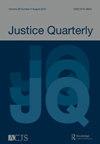警察活动与社会对犯罪热点地区警察的看法
IF 2.6
1区 社会学
Q1 CRIMINOLOGY & PENOLOGY
引用次数: 6
摘要
关于热点警务如何影响社区成员对警察的看法的证据非常有限和不确定。因此,学者们呼吁对热点地区的社区态度进行进一步研究,以指导警察制定热点战略——鉴于最近围绕警务的公众争议,尤其是在美国,这一问题尤为突出。本研究利用2018年从美国两个中等城市100多个热点地区生活或工作的1000多名社区成员中收集的调查反馈,研究了社区成员对热点地区警察活动的看法与他们对警察的更广泛态度之间的关系。双变量和多变量分析表明,当两个城市热点地区的社区成员看到更频繁的巡逻和看到积极的警察-社区互动时,他们在几个维度上(例如,对警察的信任和信心,对警察合法性的看法,以及对警察反应和程序正义的看法)对警察表现出更积极的态度。当他们目睹更高水平的调查和执法活动时,他们对警察的看法会更加负面。研究结果支持热点警务战略,即强调在热点地区进行定期、系统的巡逻,并辅以积极的社区参与努力和解决问题的工作。相反,它们暗示在热点地区加强执法活动应审慎使用。本文章由计算机程序翻译,如有差异,请以英文原文为准。
Police Activities and Community Views of Police in Crime Hot Spots
Abstract Evidence on how hot spot policing affects community members’ views of police is very limited and inconclusive. Scholars have thus called for further study of community attitudes in hot spots to guide police in the formulation of hot spot strategies—an issue that is especially salient given recent public controversy surrounding policing, particularly in the United States. Using survey responses collected in 2018 from more than 1,000 community members living or working in more than 100 hot spots across 2 mid-sized cities in the United States, this study examines how community members’ perceptions of police activities in hot spots relate to their wider attitudes about police. Bivariate and multivariate analyses indicate that community members in hot spots in both cities exhibit more positive attitudes towards police along several dimensions (e.g., trust and confidence in police, views of police legitimacy, and perceptions of police responsiveness and procedural justice) when they see more frequent patrol and when they see positive police-community interactions. They have more negative views of police when they witness higher levels of investigative and enforcement activity. The findings support hot spot policing strategies that emphasize regular, systematic patrol in hot spots, complemented by positive community engagement efforts and problem-solving work. In contrast, they imply that enhanced enforcement activity in hot spots should be used judiciously.
求助全文
通过发布文献求助,成功后即可免费获取论文全文。
去求助
来源期刊

Justice Quarterly
CRIMINOLOGY & PENOLOGY-
CiteScore
6.90
自引率
6.20%
发文量
44
期刊介绍:
Justice Quarterly (JQ) is an official publication of the ACJS. JQ is a refereed, multi-disciplinary journal that publishes theoretical, empirical and interpretive studies of issues related to criminal justice. JQ is indexed in Criminology and Penology Abstracts, Police Science Abstracts, Criminal Justice Periodical Index, and Criminal Justice Abstracts. In the past decade, JQ has become a premier journal and it continues to be a major forum for criminal justice related scholarship, making it an essential part of any library"s holdings.
 求助内容:
求助内容: 应助结果提醒方式:
应助结果提醒方式:


